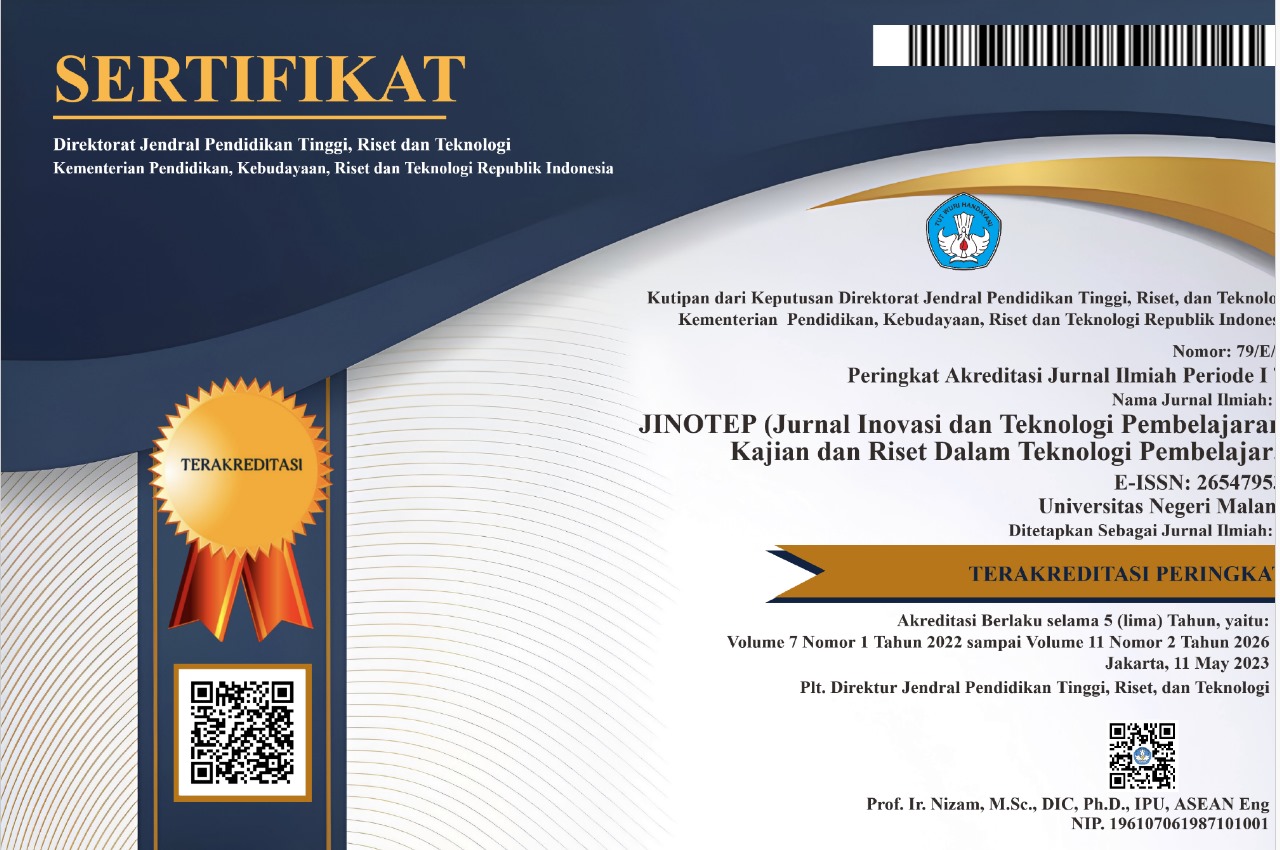Student Team Achievement Division (STAD) Cooperative Type Model Supported by Quizizz on Learning Outcomes
Abstract
Abstrak: Penerapan metode diskusi kelompok pada pembelajaran ekonomi peminatan kelas X IPS masih kurang maksimal dalam memengaruhi peningkatan hasil belajar siswa secara merata. Penelitian ini bertujuan untuk mengetahui pengaruh implementasi model pembelajaran kooperatif Student Team Achievement Division (STAD) berbantuan Quizizz terhadap hasil belajar kognitif dan psikomotorik. Quasi Experimental Design dengan desain Nonequivalent Control Group digunakan sebagai metode penelitian ini. Sampel yang dipakai yakni siswa kelas X IPS 2 dan X IPS 3 sebanyak 68 siswa. Hasil penelitian membuktikan bahwa perolehan rata-rata hasil belajar kelas X IPS 3 sebesar 79,14. Hasil ini lebih tinggi dari hasil kelas X IPS 2, yang menjadi kelas kontrol rata-ratanya, yaitu 74,52. Hasil pengujian N-gain dari rerata hasil belajar kelas kontrol tergolong kriteria rendah, sedangkan nilai hasil belajar kelas eksperimen termasuk dalam kriteria sedang. Hal ini membuktikan bahwa implementasi pembelajaran model kooperatif tipe STAD dikolaborasikan dengan media Quizizz berpengaruh dalam meningkatkan hasil belajar siswa.
Abstract: The application of the group discussion method in economics learning with specialization in class X IPS was still not optimal to influence the increase of student learning outcomes evenly. This study aims to determine the effect of the cooperative learning model on the Student Team Achievement Division (STAD) collaboration by Quizizz in the cognitive and psychomotor learning outcomes. A Quasi-Experimental Design with a Nonequivalent Control Group design was used as the research method. The total samples were 68 students from classes X IPS 2 and X IPS 3. The result shows that the average acquisition of class X IPS 3 learning outcome is 79.14. This result is higher than that of class X IPS 2 as the control class, which has 74.52. In the N-gain, the average value of the control class learning outcomes is classified as the low criterion, while the experimental class learning outcomes belong to the medium criterion. This indicates that the implementation of the STAD-type cooperative learning model assisted by Quizizz media has proven to be influential in improving student learning outcomes.
Keywords
Full Text:
PDFReferences
Citra, C. M. (2020). Keefektifan penggunaan media pembelajaran berbasis game edukasi quizizz terhadap hasil belajar teknologi perkantoran siswa kelas X SMK Ketintang Surabaya. Jurnal Pendidikan Administrasi Perkantoran, 8(2), 261–272. https://doi.org/10.26740/jpap.v8n2.p261-272
Damopolii, I., & Rahman, S. R. (2019). The effect of STAD learning model and science comics on cognitive students achievement. Journal of Physics: Conference Series, 1157, 022008. https://doi.org/10.1088/-1742-6596/1157/2/022008
Dewi, L. M., Wibawa, I. M., & Agustina, I. G. (2020). Improving science learning outcomes through Student Team Achievement Division (STAD). International Journal of Elementary Education, 4(3), 329–336. https://doi.org/10.23887/ijee.v4i3.25917
Elnovreny, J. (2021). Training in the use of the quizizz application for impressive and modern online learning for the z generation. International Journal of Engagement and Empowerment, 1(2), 86–91. https://doi.org/10.53067/ije2.v1i2.20
Elpisah, Devila, R., & Hartini. (2019). Implementation of cooperative learning model jigsaw to improve student learning outcome. IOSR Journal of Research & Method in Education (IOSR-JRME), 9(1), 60–66. https://doi.org/10.9790/7388-0901026066
Gambari, A. (2017). Relative effectiveness of computer-supported Jigsaw II, STAD and TAI cooperative learning strategies on performance, attitude, and retention of secondary school students in physics. Journal of Peer Learning, 10(6), 76–94. https://doi.org/https://ro.uow.edu.au/ajpl/vol10/iss1/6
Hakim, R. N., & Fajriah, N. (2019). Penerapan model pembelajaran student teams achievment divisions berbantuan coursesite untuk meningkatkan kerjasama siswa SMA. In Senpika II (Seminar Nasional Pendidikan Matematika) (pp. 171–178).
Isjoni, H. (2012). Cooperative Learning. Alfabeta.
Karacop, A. (2017). The effects of using jigsaw method based on cooperative learning model in the undergraduate science laboratory practices. Universal Journal of Educational Research, 5(3), 420–434. https://doi.org/10.13189/ujer.2017.050314
Kim, D. (2018). A study on the influence of Korean Middle School Students’ relationship through science class applying stad cooperative learning. Journal of Technology and Science Education, 8(4), 291–309. https://doi.org/10.3926/jotse.407
Kodir, A. (2018). Manajemen Pembelajaran Saintifik Kurikulum 2013 Pembelajaran Berpusat pada Siswa. Pustaka Setia.
Kustandi, C., & Darmawan, D. (2020). Pengembangan Media Pembelajaran. Kencana.
Kusumawardani, N., Siswanto, J., & Purnamasari, V. (2018). Pengaruh model pembelajaran kooperatif tipe STAD berbantuan media poster terhadap hasil belajar peserta didik. Jurnal Ilmiah Sekolah Dasar, 2(2), 170–174. https://doi.org/10.23887/jisd.v2i2.15487
Lane, S., Hoang, J. G., Leighton, J. P., & Rissanen, A. (2021). Engagement and satisfaction: mixed-method analysis of blended learning in the sciences. Canadian Journal of Science, Mathematics and Technology Education, 21(1), 100–122. https://doi.org/10.1007/s42330-021-00139-5
Lubis, M. A. (2017). The implementation of cooperative learning model stad to students learning outcome at SMA N 8 Padangsidimpuan. Journal of Education and Practice, 8(23), 91–96. https://doi.org/-10.7176/JEP/08-23-09
Munte, B. (2019). The effect of cooperative model “jigsaw type” in improving students’ achievement at christian education subject case: Grade XII IPA 1-2 SMA Negeri 1 Tebing Syahbandar. International Journal of English Literature and Social Sciences (IJELS), 4(2), 344–350. https://doi.org/10.22161-/ijels.4.2.24
Nair, S. M., & Sanai, M. (2018). Effects of utilizing the STAD method (cooperative learning approach) in enhancing students descriptive writing skills. International Journal of Education and Practice, 6(4), 239–252. https://doi.org/10.18488/journal.61.2018.64.239.252
Padalia, A., Jamilah, A., Yatim, H., Alimuddin, A., Handayaningrum, W., & Rahayuningtyas, W. (2022). Increasing activeness and learning outcomes at the university by applying the STAD method to learning. International Journal of Multicultural and Multireligious Understanding, 9(2), 129. https://-doi.org/10.18415/ijmmu.v9i2.3350
Puspitarini, Y., & Hanif, M. (2019). Using learning media to increase learning motivation in elementary school. Anatolian Journal of Education, 4(2), 53–60. https://doi.org/10.29333/aje.2019.426a
Putriyanti, C. C., & Fensi, F. (2017). Penerapan metode diskusi kelompok untuk meningkatkan hasil belajar siswa pada mata pelajaran IPS di Kelas IX SMP Santa Maria Monica, Bekasi Timur. Psibernetika, 10(2), 114–122. https://doi.org/10.30813/psibernetika.v10i2.1047
Salihchah, S. (2021). Meningkatkan minat serta hasil belajar pai dan bp melalui metode diskusi kelompok pelajar kelas V SDN Sidamulya 01 Semester 1 Tahun Pelajaran 2019/2020. Jurnal Nuansa Akademik: Jurnal Pembangunan Masyarakat, 6(2), 103–114. https://doi.org/10.47200/jnajpm.v6i2.798
Salsabila, U. H., Habiba, I. S., Amanah, I. L., & Difany, S. (2020). Pemanfaatan aplikasi quizizz sebagai media pembelajaran ditengah pandemi pada siswa SMA. Jurnal Ilmiah Ilmu Terapan Universitas Jambi, 4(2), 163–172. https://doi.org/ 10.22437/jiituj.v4i2.11605
Schulze, S., & Bosman, A. (2018). Learning style preferences and Mathematics achievement of secondary school learners. South African Journal of Education, 38(1), 1–8. https://doi.org/10520/EJC-d34ed5baa
Setiawan, H., Rusmiati, & Ismail, K. (2021). Pengaruh penerapan model pembelajaran kooperatif tipe student teams achievement division (STAD) terhadap hasil belajar IPS siswa kelas VIII di SMP Negeri 1 Belintang Madang Raya. Jurnal Ilmiah Pendidikan Dan Ekonomi, 5(2), 16–23. https://doi.org/-10.30599/utility.v5i01.1166
Sholichah, Z., Soetjipto, B. E., & Rahayu, W. P. (2018). The implementation of STAD and TGT learning models to improve students’learning motivation and learning outcomes (a study on the eleventh-grade students of SMKN 1 Sooko Mojokerto). Journal of Education and Practice, 9(12), 1–7. https://doi.org/-10.7176/JEP/09-12-01
Slavin, R. E. (2015). Cooperative Learning: Teori, Riset, dan Praktik. Nusamedia.
Stenlund, T., Jönsson, F. U., & Jonsson, B. (2017). Group discussions and test-enhanced learning: individual learning outcomes and personality characteristics. Educational Psychology, 37(2), 145–156. https://doi.org/10.1080/01443410.2016.1143087
Sugiyono. (2019). Metode Penelitian Kuantitatif, Kualitatif dan R&D. Alfabeta.
Wahyuni, P. (2019). The effect of cooperative learning type student teams achievement division (stad) on understanding mathematical concepts in Class VIII students of MTs N Pekanbaru. International Journal of Trends in Mathematics Education Research, 2(4), 168–172. https://doi.org/10.33122/-ijtmer.v2i4.72
Yulianto, I., Warsono, W., Nasution, N., & Rendy A.P, D. B. (2020). The effect of learning model stad (student team achievement division) assisted by media quizizz on motivation and learning outcomes in class XI Indonesian History Subjects at SMA Trimurti Surabaya. International Journal for Educational and Vocational Studies, 2(11), 923–927. https://doi.org/10.29103/ijevs.v2i11.2746
Yurisma, I. O., Lian, B., & Kurniawan, C. (2022). Pengaruh model pembelajaran student team achievement divisions (STAD) terhadap hasil belajar siswa. Jurnal Basicedu, 6(1), 591–601. https://doi.org/-10.31004/basicedu.v6i1.1981.
DOI: http://dx.doi.org/10.17977/um031v9i32022p262
Refbacks
- There are currently no refbacks.
Copyright (c) 2022 Muhammad Reza Fikri Al Firdaus, Sukidin Sukidin, Wiwin Hartanto

This work is licensed under a Creative Commons Attribution-ShareAlike 4.0 International License.
======================================================================
Jurnal Inovasi dan Teknologi Pembelajaran published by Universitas Negeri Malang in collaboration with the Asosiasi Program Studi Teknologi Pendidikan Indonesia (APS TPI) and Ikatan Profesi Teknologi Pendidikan Indonesia (IPTPI) with a MoU.
Publisher Address:
Educational Technology Laboratorium, Building D5, 1st Floor
Faculty of Education, Universitas Negeri Malang
Semarang St. No. 5, Malang City, East Java Province, Postal Code 65145
Email: jinotep.fip@um.ac.id
======================================================================

JINOTEP is licensed under a Creative Commons Attribution-ShareAlike 4.0 International License.
JINOTEP Statistics (Since July 13th, 2020)



.png)




.png)
1.png)
1.png)
4.png)
2.png)
1.png)
1.png)
.png)


_3.png)





1.png)
.png)